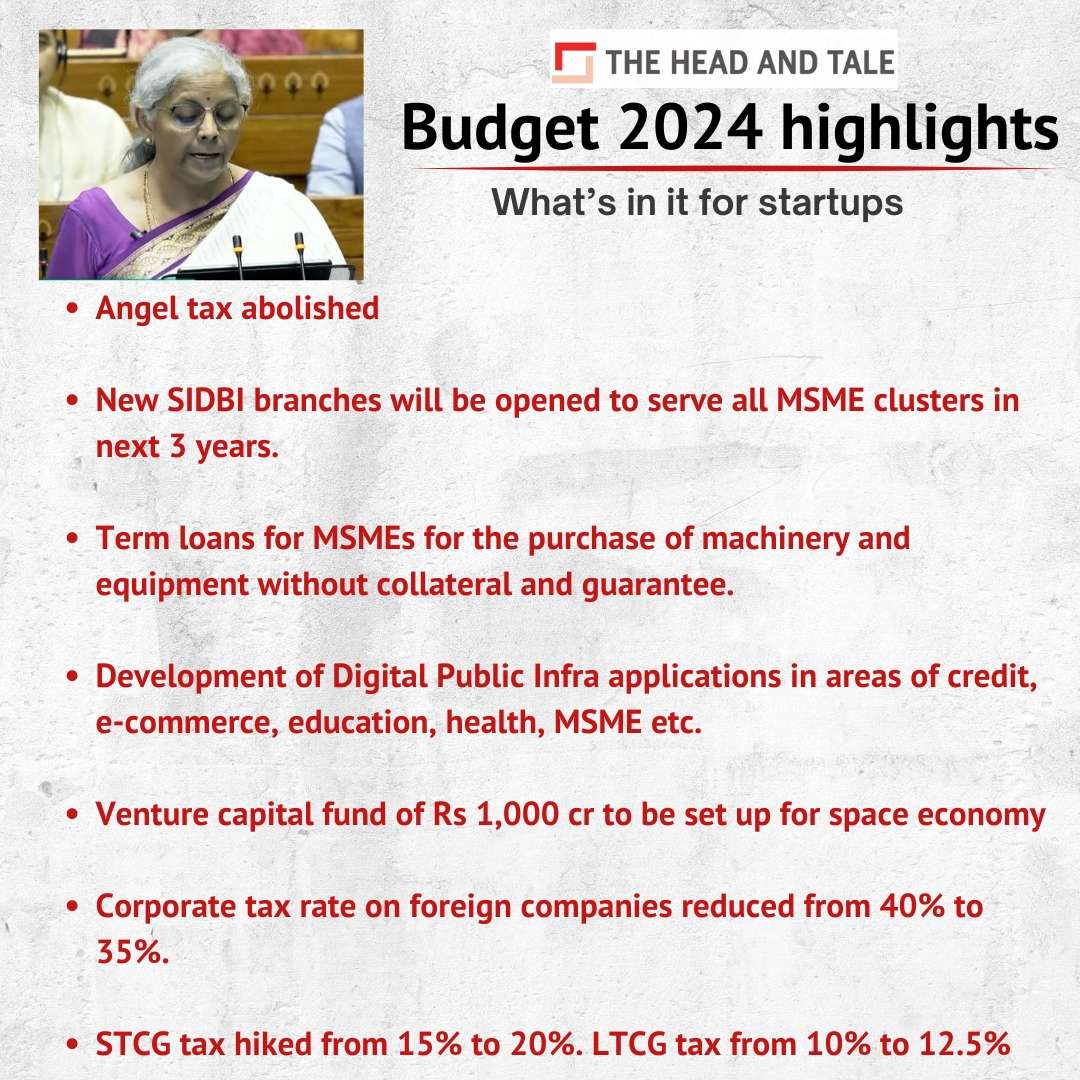

Fintech highlights of the day
05 Oct 2024, 03:27 PMJio-BlackRock gets Sebi's in-principle nod to set up mutual fund biz; Sachin Bansal-led Navi Finserv's revenue from operations fell to Rs 1,906 crore in FY24 from Rs 2,041 crore in FY23; Paytm promotes Deependra Singh Rathore to CTO.
Arti Singh



October 01, 2024
Groww’s FY24 financials: posts Rs 2890 crore in revenues; net profit at Rs 298 crore
Groww Invest Tech Pvt Ltd, which operates the stock-broking platform Groww, has clocked Rs 2890 crore in net operating income during FY24, as compared to Rs 1295 crore reported in the previous year.
According to a report by rating agency ICRA, the discount broker’s FY24 net-profit stood at Rs 298 crore – a significant jump from Rs 73 crore in FY23.
Groww Invest Tech, is a wholly owned subsidiary of Billionbrains Garage Ventures Pvt Ltd (BGV). GIT is “strategically important for Billionbrains Garage and a “key contributor to its income stream for technology and other services availed.”
As per ICRA’s another report, BGV – which owns Groww Invest Tech and Groww Credit – in FY23 reported a consolidated profit after tax of Rs 448.8 crore on net operating income of Rs 1,419.5 crore.
While the group entity’s FY24 revenues are yet to be known, ICRA stated, “The earnings improved further in 9M FY2024, before getting impacted in Q4 FY2024 by a tax-related exceptional outgo following the reverse merger.”
The Group has raised about Rs 2,900 crore equity capital till date.
Groww formally moved its domicile back to India from the US through a reverse flip by its parent firm in March 2024.
As per the National Stock Exchange’s August 2024 data, Groww’s active user base was about 1.1 crore with a market share of a little bit over 25%.
Recently, Groww’s arch rival Zerodha reported Rs 8,320 crore in revenue and over Rs 4,700 crore in profit. Last year in FY23, the company reported Rs 6,875 crore in operational revenue and Rs 2,907 crore in profit after tax. 
Indifi co-founder Siddharth Mahanot steps down
Siddharth Mahanot, co-founder and executive director of MSME-focused digital lending platform Indifi, has stepped down from his position.
The Gurugram-based non-banking finance company (NBFC) was founded by Alok Mittal and Siddharth Mahanot in 2015. Last year in December, Indifi appointed Sangram Singh, a former Axis Bank executive, as its CEO.
"After more than 9 incredible years as a Co-Founder at Indifi, I have decided to step down from my executive responsibilities at the end of this month," Mahanot said in a LinkedIn post.
“Although I am stepping away from day-to-day operations, I will continue to be involved as a shareholder and will maintain my board responsibilities. I’m confident that under the strong leadership of Alok Mittal and Sangram Singh, supported by the stellar leadership team, the company will continue to grow, thrive, and innovate."
Backed by prominent investors like ICICI Ventures, Accel, and Omidyar Network India, Indifi focuses on providing business loans and working capital to MSMEs and D2C brands. With an active loan book of Rs 2,000 crore, Indifi has disbursed over 96,000 loans worth Rs 5,100 crore across 400 cities. Indifi last raised Rs 290 crore in June 2023.
CRED FY24 financials: Rs 2,500 crore in revenues; net loss widens to Rs 1644 crore
CRED has posted Rs 2473 crore in total revenues during FY24, growing 66% year-on-year. The Bengaluru-based fintech said its operating losses came down by 41% to Rs 609 crore in FY24 from Rs 1,024 crore in FY23.
However, the net loss widened to Rs 1,644 crore during the fiscal year, ending March 31, 2024 – a 22% jump from Rs 1,347 crore reported in the previous year. This loss includes expenses related to the employee stock ownership plan and taxes.
“The expanded adoption of CRED Pay across online merchants, boosted transaction volumes by 254% during the year,” the company said in a press release. As a result, the total payment value (TPV) surged by 55% to Rs 6.87 lakh crore.
In FY24, CRED’s customer acquisition costs dropped by 40%, while its marketing expenses declined by 36% during the same period.
“Meaningful growth comes from a sharp focus on high-quality users and creating exceptional experiences for them. This commitment to putting members first and rewarding trustworthy behaviour has driven growth, engagement, and trust across our ecosystem—benefiting members, merchants, and financial institutions alike,” Cred founder Kunal Shah said.
CRED has raised a total of close to $1 billion in funding; and counts PeakXV, Ribbit Capital, Tiger Global, and others among its investors.
September 26, 2024



September 23, 2024

- Zerodha is about to launch Margin Trade Funding (MTF).
- Through Rainmatter, the company owns stakes in over 120 companies, with an allocation of Rs 680 crore. “We partner with startups working in fintech, climate, health, sports etc.” “As an extension, we have also committed over Rs 1000 crores to Rainmatter Foundation, the non-profit that we started in 2020 that works on environment and climate action, and livelihoods associated with them, critical issues that are of increasing importance.”
- The company, which provides loan-against-securities through Zerodha Capital, currently has a book size of about Rs 300 crores.
- Zerodha Fund House, operating as a JV with smallcase, has over Rs 3000 crores in AUM.













'Acquisition by bank or large corporate best option for Paytm': Bernstein
Bernstein, a top brokerage firm, has outlined strategic options for Paytm to maximize its potential, with mergers and acquisitions seen as the most promising path forward.
The equity analyst, which has set a target price of Rs 600 per share for Paytm, has said the Noida-based fintech – in its current form – could reach profitability by 2026-27.
However, the most favorable outcome for the Vijay Shekhar Sharma-led company would be its acquisition by a bank or a large non-banking financial company (NBFC).
Bernstein believes that such a merger could enable banks to tap into Paytm’s extensive customer base, driving innovation and growth within the financial sector. While, Paytm could cross-sell non-banking products, introduce innovative credit solutions, and leverage its established distribution network to enhance consumer offerings.
The report also highlights the possibility of Paytm receiving a large investment from a major corporate house as an alternative strategy. Such a move could swiftly revive Paytm’s operations and mitigate potential future regulatory challenges, allowing the company to regain its footing in a competitive market.
From Reliance Jio to the Adani Group and the Tata Group, large firms are building fintech businesses in-house. Such efforts can get a major boost through the acquisition of Paytm, according to Bernstein.
It also proposed a "middle path," suggesting that Paytm could attract a substantial investment from a major corporate house, which could speed up the company’s revival and offer some protection against future regulatory challenges.
Paytm’s parent entity One 97 Communications has been struggling ever since its associate entity Paytm Payments Bank was barred by the Reserve Bank of India due to severe regulatory lapses.
Bernstein said the losses reported by the company were a direct result of the business impact on its banking operations. Slice-North East SFB merger gets NCLT approval
Slice-North East SFB merger gets NCLT approval
Fintech lender Slice received approval from the National Company Law Tribunal, Guwahati Branch, to merge its assets with North East Small Finance Bank (NESFB).
The order comes a year after the Reserve Bank of India gave the no-objection certificate (NOC) to the merger. In March this year, the firm received Competition Commission of India (CCI) approval too.
Founded by Rajan Bajaj, Slice has raised over $340 million till date and was valued above $1.5 billion during its Series C round in November 2021. It counts Tiger Global, Insight Partners, EMVC, Blume Ventures among its backers.
Earlier Slice used to issue credit over prepaid cards to students and young customers. However, after the RBI came up with a circular banning credit over PPI, all fintechs, including Slice, had to stop issuing prepaid cards loaded with credit line.
Last year in October, Slice merged with North East Small Finance Bank. As part of the process, Slice previously picked 5% in North East SFB in 2022 “just to get comfort” and then over a period of time, it bought an additional 5% stake last year.
With Slice having over 50 shareholders and the small finance bank having 4-5 shareholders in total, a back-of-the-envelope calculation suggests that Slice shareholders will own about 95-97% stake in the merged entity; whereas the remaining 3-5% will be owned by North East SFB shareholders. The total shareholders in the combined banking entity is going to be 55-60.
NESFB has 208 branches across the seven North East states along with West Bengal and has largely focussed on customers from the rural areas and bottom of the pyramid segment.  Pine Labs secures initial nod from NCLT to merge Singapore entity with India unit
Pine Labs secures initial nod from NCLT to merge Singapore entity with India unit
Pine Labs has secured its initial approval from the National Company Law Tribunal (NCLT) to merge its Singapore-based parent entity with the India unit.
This is a critical step for the Singapore-headquartered payments firm for shifting domicile back to India.
In May, the company received the approval from a Singapore court to shift its operations to India. As part of the flip, Pine Labs Singapore will shift to Pine Labs India.
After the NCLT’s first set of approval, the Noida-based fintech has to seek approvals from government and regulatory bodies.
Pine Labs is among several major fintechs, including Razorpay and Groww, looking to shift its domicile to India, ahead of listing plans. India’s account aggregator framework crosses 100 million consents: Sahamati
India’s account aggregator framework crosses 100 million consents: Sahamati
As of August 15, 2024, the total number of successful consents on AA Framework has crossed 100 million, according to data shared by Sahamati, an industry alliance for the account aggregator (AA) ecosystem.
Sahamati estimates about 80-90 million people are using AA in India, which translates to 8% of the adult population. In the financial year 2024, AA consents grew by 1059% -- making India’s AA ecosystem, the fastest growing open finance ecosystem in the world.
The current usage and penetration of Open Finance/ AA Framework is expected to achieve a penetration of 25-30% of the Indian population by the end of FY 2024-25.
Internationally, Open Finance is defined as a framework that allows customers to share their financial data with third-party providers, enabling the development of new financial products and services. However, worldwide, consent management is entrusted to the financial information users of Open Finance Frameworks.
In India, Account Aggregators act as consent managers independent of financial information users (FIUs), that enable individuals and businesses to share their financial data with their consent and manage their consents at one place.
“The metrics of growth on all aspects have been encouraging. The use cases have been expanding with FIUs using AA for streamlined tasks like customer onboarding to specialised tasks like controlling frauds. Growth in consent requests from 5.5 million in FY 2022-23 to 63.75 million in FY 2023-24 by customers indicates a higher degree of comfort and acceptance of the system. Our goal is to make AA accessible to customers in the remotest parts of India, democratising financial services and data sharing,” said BG Mahesh, CEO, Sahamati.
The usage has expanded from the basic use case of underwriting loans to personal finance management, portfolio management, assessing early warning signals and monitoring of loan accounts, loan collections, issuance of insurance policies, opening of demat accounts and investment advisory.  BharatPe raises stake to 60% in NBFC Trillion Loans
BharatPe raises stake to 60% in NBFC Trillion Loans
BharatPe has increased its stake to nearly 60% in non-banking financial company (NBFC) Trillion Loans, according to Entrackr report.
The fintech giant has invested around $8-9 million in the NBFC and increased its stake from 51% to close to 60%.
Last year in May 2023, BharatPe acquired the majority stake in the Mumbai-based NBFC in a deal valued at Rs 300 crore. TrillionLoans was earlier owned by Achal Mittal and Gautam Adukia, who also own peer-to-peer (P2P) NBFC LiquiLoans.
BharatPe, which had failed to get its own NBFC license in 2019, got the RBI approval last year to buy majority stake in this NBFC.
After the acquisition, Ravindra Pandey, Nalin Negi and Sabyasachi Senapati were appointed to the board of the NBFC firm.
“Trillion Loans is now valued at $100 million. BharatPe is planning to fully acquire 100% stake in Trillion NBFC by next 24 months,” Entrackr reported.
Currently, BharatPe owns 49% in Unity SFB whereas Centrum Group owns the remaining 51% stake. “BharatPe is also pushing very hard to increase its stake in Unity Small Finance Bank to get more control.”
Earlier this year, BharatPe raised a larger debt round while Trillion Loans closed a separate debt from Credit Saison. Jio sets up new subsidiary to expand financial services portfolio
Jio sets up new subsidiary to expand financial services portfolio
Jio Financial Services has set up a new subsidiary to expand its financial services portfolio. This move aligns with Jio Financial's ongoing efforts to establish a foothold in the stock broking and wealth management industry.
The subsidiary ‘Jio Finance Platform and Service Limited’, headquartered in Mumbai, will focus on the distribution of a wide range of financial products and related services.
Jio Financial Services has committed an initial investment of Rs 1 lakh towards the subscription of 10,000 equity shares, each valued at Rs 10.
This development follows Jio Financial Services’ recent partnership with BlackRock Inc., aimed at transforming India’s asset management industry through a digital-first approach. The joint venture, announced earlier this year, underscores Jio Financial's ambition to democratize access to investment solutions for Indian investors. Cashfree appoints Rohit Katyal as enterprise sales head
Cashfree appoints Rohit Katyal as enterprise sales head
Cashfree Payments, Bengaluru-based payment aggregator, has appointed Rohit Katyal as its sales head to drive Enterprise business for BFSI and other critical business verticals.
Prior to this, Katyal was the chief business officer at another payment aggregator Phi Commerce.
An MBA alumnus of IIFT Delhi, Katyal comes with over two decades of experience in fintech and banking. Previously, he worked at Easebuzz as its group head business, where he led the company's business and product strategy.
He also served as director and head of BFSI, enterprise sales at Razorpay. Besides working at Airtel Payments Bank and Kotak Mahindra Bank, Katyal has also worked with Paytm in the past, where he led sales team for Paytm's payment gateway and digital wallet solutions.
Last month, Cashfree became the first payment service provider to receive the PA-CB (cross-border payment aggregator) license from the RBI. Cashfree secured the payment aggregator license in December 2023. Skydo raises $5 million pre-Series A from Elevation Capital
Skydo raises $5 million pre-Series A from Elevation Capital
Cross-border payments startups Skydo has raised $5 million in a pre-Series A funding round led by existing investor Elevation Capital.
The funds will enable Skydo to scale operations and continue to strengthen its risk monitoring and compliance.
Founded in 2022 by Srivatsan Sridhar, former head of business at OLA, and Movin Jain, former head of payments product at PhonePe, Skydo earlier raised $5.2 million in a seed round led by Elevation Capital.
With the average cost of receiving inward remittances at 3-10%, businesses experience critical issues such as disrupted cash flow, reduced profit margins, and increased debt. It is estimated that in 2020 alone, Indian exporters lost over $3 billion to foreign exchange fees, as per a study done by Capital Economics.
Skydo, which offers a flat-fee pricing model that provides real-time currency exchange rates, no processing fees and zero FX mark-up costs, claims that it currently processes payments for over 6,000 Indian SMB exporters and has processed payments of over $100 million since its inception. Skydo’s platform enables customers to collect payments in 32 currencies from key markets such as the US, UK, Canada, Europe, Singapore, and the UAE, which account for 80-90% of remittance inflows into India.
“This investment will help us acquire payments licenses across geographies, expand internationally and enable customers to send and receive business payments across multiple countries,” Sridhar said.
“Our goal is to empower exporters and enterprises to operate seamlessly on a global scale, aiming to process $750 million by 2025 ,” Jain added.
Operating under the RBI’s OPGSP (Online Payment Gateway Service Provider) framework, which currently serves as the primary payment method for over 300,000 MSME exporters across India, Skydo has also applied for the cross-border payment aggregator (PA-CB) license from the RBI.














Global cryptocurrency exchange Binance is reportedly embroiled in a significant tax issue in India. The Directorate General of GST Intelligence (DGGI) in Ahmedabad has issued a show-cause notice to Binance, demanding Rs 722 crore ($86 million) in unpaid Goods and Services Tax (GST).
The demand arises from earnings credited to Nest Services Limited, a Binance Group company based in Seychelles, Times of India reported.
The DGGI's zonal unit has reached out to Binance's affiliated companies in Seychelles, the Cayman Islands, and Switzerland, urging compliance with GST regulations. However, the agency reportedly did not receive any response from Binance or its associated entities.
In response to these tax compliance concerns, Binance has appointed a local counsel to engage with the DGGI.
Earlier this year, the Financial Intelligence Unit of India (FIU) confirmed Binance's registration with the regulatory body. Despite this, Binance faced a penalty of Rs 18 crore ($2.25 million) for failing to comply with local anti-money laundering (AML) regulations.
Following the tax compliance issues with Binance, the DGGI has intensified its scrutiny of financial transactions within online gaming platforms and marketplaces. This effort aims to regulate the burgeoning digital currency market, the report added.
Binance has been collecting fees from Indian users trading virtual digital assets (VDAs) on its platform, prompting the notice under the online information database access or retrieval (OIDAR) services category. OIDAR services refer to internet-based services that require minimal human intervention and are subject to specific GST rules in India.



In a surprising turn of events, WazirX announced on Saturday that it is abandoning its controversial plan to socialize losses following the recent security breach. The cryptocurrency exchange, which suffered a massive loss of over $230 million due to a significant security breach on July 19th, had initially proposed a plan to distribute the financial impact equitably across all users, a move that sparked outrage within the crypto community.
[The Head and Tale looks back at the volatile journey of WazirX and its founder Shetty to get a sense of how far the company has come and where it currently stands.]
The proposal, known as the 55/45 approach, was intended to offer a faster and more flexible recovery solution compared to traditional methods, which can take years. However, the plan drew severe criticism for its lack of clarity and for imposing financial burdens on users whose funds were not affected by the breach. Many in the crypto community viewed it as an unfair solution, and the backlash was swift and vocal.
In a blog post last week, WazirX stated that it was navigating the situation with transparency and fairness, but the proposed strategy did little to quell the growing dissatisfaction among its users. The exchange has since acknowledged the concerns raised and is now exploring alternative options.
According to several media reports, WazirX is actively seeking other solutions and is open to strategic investments, mergers, and acquisitions as part of its efforts to address the fallout from the breach. The company has promised to propose a new plan in the coming weeks, aiming to find a resolution that will be more acceptable to its user base.
The incident highlights the challenges faced by cryptocurrency exchanges in dealing with security breaches and the importance of maintaining trust with their customers. As WazirX works to restore its reputation and regain user confidence, the crypto community will be watching closely to see how the exchange navigates this turbulent period. MCA fines Zerodha AMC, Nithin Kamath over corporate law violation
MCA fines Zerodha AMC, Nithin Kamath over corporate law violation
Zerodha Asset Management Private Limited, along with its key directors, including founder Nithin Kamath, has been penalized by the Ministry of Corporate Affairs (MCA) for failing to appoint a Chief Financial Officer (CFO) within the required timeframe, thereby violating corporate law.
On January 9, 2024, Zerodha Asset Management acknowledged its failure to appoint a CFO, admitting the violation of Section 203 of the Companies Act, 2013. This section mandates that companies considered public and with a paid-up share capital exceeding Rs 10 crore must have key managerial personnel, including a CFO.
According to the MCA's order, "Section 203(1) of the Act mandates that companies of certain sizes must have full-time key managerial personnel, including a CFO and company secretary. Rule 8 of the Companies (Appointment and Remuneration of Managerial Personnel) Rules, 2014, specifies that any public company with a paid-up share capital of Rs 10 crore or more must comply.”
Zerodha Asset Management did not comply with this rule until March 24, 2023, when Chintan Bhatt was finally appointed as CFO. This 459-day delay led to the ministry's decision to impose significant penalties.
In response to the MCA's decision, Vishal Jain, CEO of Zerodha Asset Management Private Limited, clarified that the period covered by the order was after the company was incorporated but before it began operations. He stated, "The ROC order was issued in response to the suo-motu application filed by the company. The Company is contesting the order, and an appeal has already been filed with the Regional Director, Hyderabad on July 16, 2024."
The MCA has imposed a maximum penalty of Rs 5 lakh on the company itself. Additionally, key directors and officers who were in default during this period have also been fined. Founder and Director Nithin Kamath was fined Rs 4.08 lakh, Director Rajanna Bhuvanesh received a penalty of Rs 5 lakh, CEO Vishal Virendra Jain was fined Rs 3.45 lakh, Company Secretary Shikha Singh Rs 3.45 lakh, Director Nithya Easwaran Rs 1.50 lakh, and Director Tushar Mahajan Rs 1.50 lakh.
Launched in November 2023, Zerodha Fund House -- a collaboration between brokerage firm Zerodha and wealth-tech platform smallcase -- is a passive-only asset management company and claims to have over Rs 2,000 crore in assets under management (AUM).







 India sees growth in VC investments during April-June quarter
India sees growth in VC investments during April-June quarter 


However, swift intervention by the Maharashtra Cyber Crime division led to the recovery of Rs 33 crore.
Maharashtra Cyber Inspector General of Police Yashasvi Yadav revealed that the remaining Rs 7 crore had been dispersed across several mule accounts. "The stolen bank funds were transferred to what are known as money mule accounts. Out of the Rs 40 crore, Maharashtra Cyber was able to freeze approximately Rs 33 crore. This frozen amount has been returned to the rightful account holders. The process of filing an FIR is currently underway," Yadav said.
The incident came to light on July 19 when a diligent bank official reported the suspicious activity. In response, Maharashtra Cyber, the state police's specialized unit for tackling online fraud, sprang into action. By collaborating with various financial intermediaries, they successfully recovered Rs 31 crore that very evening.
The incident has surfaced just as the Reserve Bank of India has been ramping up its alerts about mule accounts, and policymakers are actively working on strategies to stop these accounts from being exploited for online fraud.







.jpg)






.jpg)









































CoinDCX buys UAE-based crypto platform BitOasis
Ten months after picking a stake in BitOasis, Indian cryptocurrency platform CoinDCX has acquired the UAE-based cryptocurrency trading platform.
The deal value is not disclosed.
BitOasis, which was set up in 2016 by Ola Doudin, has raised over $40 million in total funding from investors such as CoinDCX, Wamda Capital, Jump Capital, Pantera Capital, and Global Founders Capital till date.
The acquisition is expected to strengthen CoinDCX’s presence across the Middle East and North Africa (MENA) region.
The BitOasis platform, available in 15 countries across the region, has processed over $6 billion in trading volume till date.
“Our expansion strategy begins with the MENA region, capitalizing on its mature market and the population’s keen interest in crypto investment,” CoinDCX co-founder Sumit Gupta said in a statement.
“BitOasis was the first platform to register with the UAE Financial Intelligence Unit in 2021. Its licenses in Bahrain and the UAE reflect its commitment to operating within established regulatory frameworks,” he added.
Founded in 2018, CoinDCX claims a base of 15 million users. The company, which is backed by the likes of Coinbase Ventures, Polychain Capital, Bain Capital among others, says it facilitates quarterly trading volumes exceeding $840 million in a spot in 2024.
CoinDCX also plans to look at other regions with growing crypto activity.
NPCI partners Network International to enable UPI payments in UAE
NPCI International Payments Ltd has partnered with UAE-headquartered digital payments company Network International to enable the acceptance of QR code-based Unified payments Interface (UPI) payments for its merchants in UAE.
Now, non-resident Indians (NRIs) and Indian tourists can make UPI transactions via Network International's PoS (point-of-sale) terminals across UAE.
According to the company, Network International – which offers digital payments in the Middle East and Africa – will allow Indian tourists and NRIs with Indian bank accounts to use UPI for transactions across Network’s PoS terminals in the UAE.
Currently, Network has more than 200,000 PoS terminals across 60,000 merchants in hospitality, retail, transport and supermarket segments.
NPCI, in its statement, said UPI acceptance will be “rolled out progressively, covering a wide range of establishments from retail stores and dining outlets, as well as tourist and leisure attractions including Dubai Mall and Mall of the Emirates.”
NPCI International CEO Ritesh Shukla expects this partnership deepening UPI’s presence in the UAE. “By growing UPI payment acceptance across merchants in the UAE, we are not only providing Indian travelers with a seamless and familiar payment experience, but also promoting the use of innovative digital payment solutions internationally.”
“We are delighted to partner with NPCI International Payments Limited to strengthen the payments ecosystem for Indians visiting or working in the UAE. We are confident that this partnership will drive a robust digital payments ecosystem in the country that will increase cashless transactions,” added Nandan Mer, group CEO, Network International.
Earlier in March, India’s largest UPI payments app PhonePe said its users traveling to UAE can make UPI payments at Mashreq's NEOPAY terminals. The collaboration was facilitated through Mashreq's partnership with NIPL.
The number of Indian tourists visiting the Gulf Cooperation Council (GCC) countries is expected to rise to 9.8 million in 2024, with the UAE anticipating 5.29 million arrivals from India. This growth is fueled by both business and leisure travel.
RBI asks banks to intensify efforts against mule accounts
Reserve Bank of India (RBI) governor Shaktikanta Das urged the banks to increase their efforts against mule accounts.
While addressing a meeting with heads of public and private sector banks, Das also asked the banks to intensify its measures for customer awareness and educational initiatives, in order to curb digital frauds.
Mule accounts are bank accounts used by offenders, often through unwitting individuals (money mules), to transfer illicit funds and obscure their origins. These accounts facilitate money laundering, fraud, and other financial crimes.
The governor also emphasized on the need for the banks to ensure cybersecurity controls and effective management of third-party risks.
During the meeting, Das noted the consistent improvements in banks asset quality, loan provisioning, capital adequacy, and profitability.
Additional topics of discussion included the ongoing disparity between credit and deposit growth, trends in unsecured retail lending, and liquidity risk management.
The bankers also talked about the use of the rupee for cross-border transactions and credit flows to small businesses.
In its previous meeting with banks in February this year, the RBI urged them to remain vigilant about potential risk build-ups. The central bank also emphasized concerns regarding business model viability, significant growth in personal loans, compliance with co-lending guidelines, and bank exposure to the NBFC sector, among other issues.

Paytm Payments Bank, auditor clash over viability
Paytm Payments Bank is reportedly in a dispute with its auditor JC Bhalla & Co over certification of its accounts for the financial year 2024. According to the Economic Times report, the auditor has raised concerns about the bank's viability due to the Reserve Bank of India’s restrictions, which have almost halted its operations.
These concerns are about whether the company can continue operating.
The Vijay Shekhar Sharma-owned payments bank has “strongly” objected to the auditor's suggested qualifications. If the ET report is to be believed then the company’s argument is that the strength of the Paytm brand will support a recovery plan and that new capital will be invested to aid this.
Paytm is worried that these qualifications might slow down its efforts to obtain a payment aggregator license for Paytm Payments Services Ltd.
“In order to get the auditors to approve the financial statements, the company is trying to persuade them to accept a statement from management saying the business will be profitable in the future or could also bring in legal opinion to that effect,” the report added.
Paytm parent company One97 Communications’ senior management is also seeking the RBI’s intervention; however, the central bank is unlikely to intervene, the report said.
In January this year, Paytm Payments Bank was barred by the RBI from taking new deposits starting March 15 due to not following know-your-customer (KYC) rules. The payments bank has been almost non-functional since then.
US-based firms pick PB Fintech stakes from early investors
Global investment manager Capital Group, asset management companies T Rowe Price, Fidelity and Vanguard have bought shares in PB Fintech, a parent company of insurance marketplace Policybazaar and loan marketplace Paisabazaar.
“Capital Group via its various investment vehicles now owns a 10% stake in Gurugram-based fintech firm,” the Economic Times report said. The recent exchange of shares has happened via multiple bulk deals.
Apart from global investors, domestic institutional players and insurance companies have also increased their stake in PB Fintech. According to the report, life insurance firms like SBI Life, Max Life Insurance and Bajaj Life have cumulatively invested Rs 2,900 crore in PB Fintech.
Ever since it went public in 2021, PB Fintech saw its several early stage investors exit the firm either fully or partly.
Earlier this year, Softbank, one of the largest investors in Policybazaar, also exited the firm completely. The Japanese investor – which had invested around $200 million in the company – earned approximately $650 million in returns.
In addition, PB Fintech founders Yashish Dahiya and Alok Bansal also offloaded some shares earlier this year. According to the ET report, in May, Dahiya sold 10.8 million shares worth Rs 1,298 crore, while Bansal sold 5.8 million shares worth Rs 768 crore.
PB Fintech, which also owns an account aggregator licence and has also applied for a payment aggregator licence, reported an operating revenue of Rs 3437 crore during the financial year ending March 31, 2024. In FY24, the company posted a net profit of Rs 64 crore as compared to a loss of Rs 488 crore reported in FY23.
Zerodha may end zero brokerage due to Sebi circular, says Nithin Kamath
Discount broking firm Zerodha may start charging a brokerage fee for equity deliveries, which is currently free, and also increase brokerage for F&O (futures and options) trades. This comes after Sebi mandating uniform charges by market infrastructure institutions like stock exchange.
On July 1, the capital markets regulator, in its circular, said that charges levied by market infrastructure institutions such as stock exchanges, clearing corporations and depositories should be uniform and not based on volumes.
Zerodha founder Nithin Kamath, on the micro-blogging platform X, wrote, “SEBI issued a new circular mandating all market infrastructure institutions, like stock exchanges, to be "true to the label" in how they levy charges."
"This circular has a significant impact on brokers, traders, and investors. Stock exchanges charge transaction fees based on the overall turnover contributed by brokers. The difference between what the brokers charge the customer and what the exchange charges the broker at the end of the month is a rebate, which goes to brokers. Such rebates are common across the major markets in the world.”
He further continued that these rebates account for about 10% of Zerodha’s revenues and anywhere between 10-50% of other brokers across the industry. “With the new circular, this revenue stream goes away.”
Kamath said that the company is still trying to ascertain the “second-order effects of the circular.”
“With the new circular, we will, in all likelihood, have to let go of the zero brokerage structure and/or increase brokerage for F&O trades. Brokers across the industry will also have to tweak their pricing,” Kamath said, while adding that Zerodha was one of the “last remaining brokers that offered free equity delivery trades.”
There have been strong market reactions post SEBI circular. Share prices of the brokerage stocks like Angel One were down by 10%, and those of 5Paisa Capital, SMC Global Securities and Motilal Oswal plunged 2-5% on July 2. Centre planning new accounting standards for banking, insurance sectors
Centre planning new accounting standards for banking, insurance sectors
The ministry of corporate affairs (MCA) is in the process of developing new accounting standards for the insurance and banking sectors, several media reports said.
“We will bring the new accounting standards for the insurance sector shortly. For the banking sector, the ministry is in discussions with the Reserve Bank of India,” MCA secretary Manoj Govil said, while speaking at an ICAI (The Institute of Chartered Accountants of India) event.
The new standards modeled on IFRS 17 will replace Ind AS 104 currently in usage, which would align Indian norms with international practices. This would provide clearer understanding of risk exposure to global investors and additionally attract foreign direct investments, Economic Times reported.
In addition to this, the ministry said it is also getting recommendations from NFRA (National Financial Reporting Authority) and ICAI to draft new accounting standards for Limited Liability Partnerships (LLPs).
The MCA is closely working with ICAI on creating large domestic CA firms out of India, Financial Express quoted Govil as saying. “We are working together to bring in an environment where "Indian accounting and auditing firms emerge as global leaders."
The author is Founder and Editor of The Head and Tale. She can be reached at
[email protected]
Tweets @artijourno









